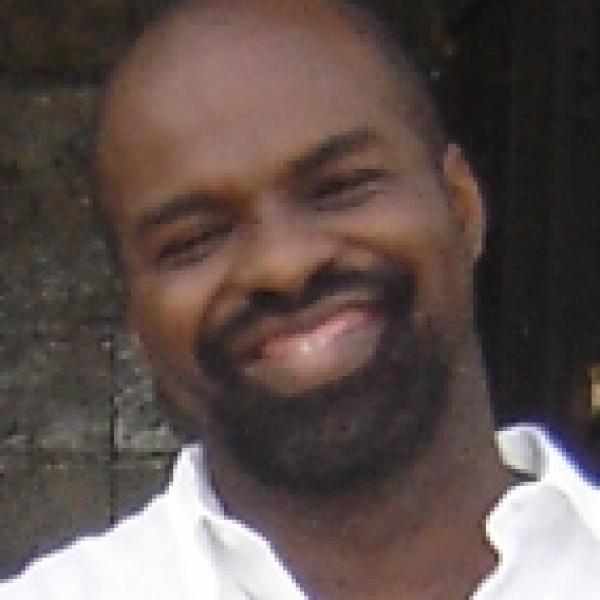Introdução
By creating educational programs that recognize Afro-descendents’ historical contributions to science, Lázaro Cunha is breaking the scientific and technological divide that has kept the majority of the Brazil’s black population marginalized. Lázaro is popularizing scientific knowledge in order to strengthen the black movement within the knowledge society, while also increasing the country’s potential for technological development.
A nova ideia
While the Afro-descendant black population has made some progress in the educational system in Brazil, they have not made the strides hoped, particularly into the important and promising field of science and technology. As an activist of the black movement, engineer, and member of the Steve Biko Foundation, Lázaro understands that because racial differences are due to systemic problems, injecting them into the area of science and technology creates still more complexity.
To effectively include blacks in this promising field, Lázaro constructed the Program for the Promotion of Science Oguntec for Afro-descendants. It includes a political education proposal for popularizing science that takes in consideration the low self-esteem and the low educational levels among this population. One of the central points of Oguntec is the educational methodology for the youth of the program and schools and communities of the neighborhood, in which the scientific content as well as its experimentation, has Afro references that disprove stereotypes about blacks capacity to work in these fields.
In addition to educational work, Lázaro is active in the field of state and national public policymaking in the areas of education, and science and technology. Through partnerships with State Secretaries of Bahia and with a proposal to take the methodology of Oguntec to all public schools, he is putting the popularization of science as well as attention to the question of race, on the agenda. Within the Black movement, his signatory idea is to impel this population to catch sight of future tendencies and to update their demands with proposals of science and technology.
O problema
Slavery in Brazil was abolished only 120 years ago without the country establishing any structural and systemic changes in the life of the black population. This reality continues to exclude blacks from work that has become international in scope and increasingly values activities linked to science and technology. Nevertheless, rather than seeing this field as having the potential to transform the black population, the tendency is to keep them from having access to this type of knowledge, thereby restricting the possibilities of development, not only of the black population but the country as a whole.
The majority of the black population is poor, and public education, which could reverse this situation, is of a low quality. While the difference between the black and white populations in education in general is evident, it becomes an abyss in the area of technology. The size of this abyss can be seen everywhere from the lack of black teachers in the physical and biological sciences, to the low enrolment of blacks in higher education courses linked to technology.
Black students have to contend not only with a poor quality of education and a lack of contact with the field of science and technology, but also with the absence of emotional support to encourage them to believe they can compete in this area. Schools, with their didactic books and mostly white teachers, do not often make any reference to successful black scientists, doctors, or engineers. The pedagogy employed in Brazilian education is conservative, theoretical, and technical. It offers little autonomy for students to learn through curiosity or the pleasure of working with science.
Black families encourage their children to enter what are considered to be the easier higher education courses, since they may not conceive the idea that their child could be a doctor. Children and young people are therefore raised in an environment that does not support a belief in their potential to enter promising areas such as science and technology.
According to data of the National Institute of Educational Research and Studies (INEP), the highest participation of black graduates in these areas occurs in the chemistry course, where only 3.6 percent of graduates are black. The Getulio Vargas Foundation (FGV) also identified racial inequality in access to digital means of communication; the percentages of access according to race: 41.66 percent Asian; 15.14 percent White; 4.06 percent Mixed race (pardos- descendent of African and White); 3.97 percent Black and 3.72 percent Indigenous.
This explains why the system of quotas—a great victory for the black movement—in Brazilian public universities does not guarantee the entrance of this population into courses in the technology area. The movement is still far from creating black professionals with a strong political and historical awareness in the debate about the human genome, for example. The organizations which fight for the democratization of access to quality public education are still concerned with the rescue of African artistic and cultural traditions of the black population. The black movement seems unable to see the new challenges of the “society of knowledge” and the benefits generated by the insertion of the issue of race into the areas of science and technology.
Therefore, to deprive 46 percent of Afro-descended Brazilians the possibility of access to this knowledge undercuts development aspirations as well, since it will not end the socioeconomic gap between the ethnic groups. As the most promising area, as much in the perspective of professional career as in the potential for social transformations, the work to stimulate and prepare black children and youth to explore the area of science and technology is a challenging task with tremendous potential.
A estratégia
Lázaro was a member of a group of black youth which created the Steve Biko Institute in 1992. Their first initiative supported the enrolment of black youth in higher education in Brazil—a pre-university entrance exam course for blacks rapidly spread throughout the country. Over the years as an integrant of the group, director of the institute, professor of the pre-university course and an engineer, Lázaro realized that the scarcity of blacks interested and effectively working in the area of science and technology is profound. It has systemic consequences and will not be resolved only with the reinforcement of study (i.e. with extra classes).
To insert the question of the popularization of science and at the same time, to put forward the issue of race in the field of the promotion of scientific knowledge, Lázaro considered the educational deficits and stereotypes that surround youth; the deficiency of the education system itself to offer experimental contact with science; and the necessity to strengthen the self-esteem of black youth and their families. To address these issues, he created the Program for the Promotion of Science Oguntec in 2003. This has three lines of work: Raising the level of education and self-esteem of black youth for their entrance into higher education in the areas of science and technology; popularization of science; and digital inclusion.
In order to raise the level of education for youth who wish to follow careers in the areas of science and technology, Lázaro utilizes a methodology created by the institute of popular pre-university courses and emphasizes the disciplines in the area of physical and biological sciences (100 percent of the first students were approved). This course includes the subject of Citizenship and Black Awareness (CCN) and is one of the principal strategies to reinforce self-esteem among black students. The CCN classes are offered to youth throughout the three years they participate in the program. In addition to the specific classes of CCN, the sciences pedagogy celebrates Brazilian black thinkers and scientists formative to the history of science. These are important references to break the stereotype that blacks have do not aptitude in these areas.
Digital inclusion is another element that promotes “technological literacy,” which permits youth to achieve a condition of equality in the competition with other youth for places in university and the job market. The IT laboratory installed in the institute is also utilized as a channel for influencing other organizations to elaborate their own proposals of science and technology promotion based on contact with the political-pedagogic proposal of Oguntec.
The line of the popularization of science encompasses both the youth participants in Oguntec and more far-reaching initiatives. The program youth are offered an “Introduction to Science and Technology” with the objective of promoting a real-life scientific and technological experience. The method is participatory and focused on practical experience. The theoretical knowledge, for example, is put into practice in the “Science and Technology Seminars,” broaching themes such as micro-electronics, nanotechnology, biotechnology, mechatronics, robotics, energy sources, and the worldwide contribution of the African diaspora to science. Parents are informed of the work developed by their children, and will support them in their choice of a career in science and technology. To bring the youth closer to professional practice, visits to scientific institutions and technology companies are also made.
Additionally, in the line of the popularization of science, Lázaro is very clear that it is necessary to expose other youth and children to the scientific and technological contributions of the African people. Oguntec therefore offers a series of initiatives with presentations, expositions, and workshops about scientific themes in communities and schools of peripheral neighborhoods of Salvador, bringing the low-income population closer to the world of science and technology. The project also promotes the exchange of Brazilian students with overseas universities.
To reach a wider public, Lázaro has participated in decision-making in the public sphere, influencing the Municipal and State Secretaries of Education, of Science and Technology and of Promotion of Equality to incorporate practices of the popularization of science with references to the contributions of the black population. Together with the Municipal Secretary of Education of Salvador, for example, a KIT for the Training of Teachers (law 10.639), with a chapter about science and technology, which makes references to black scientists of importance to Brazil and the world, has already been published and distributed. Lázaro is also in discussion with the Secretary of Science and Technology in Bahia to create QuilomboTecs; a replication of the initiative of Oguntec in Salvador’s public schools.
The educating of Afro-descendents in the areas of science and technology also has great potential to transform the scene of this sector in Brazil. By participating in delicate debates, such as those concerning genetic ethnic differences, black professionals have a great chance to oppose the prejudicial positions that are consolidated in this area. Through his participation in events in the scientific area, Lázaro has already been able to include in the discussion the popularization of science and the question of race at both the state and national level. In addition, he made use of his master’s degree on the Physics Faculty of the Federal University of Bahia, to systematize the impact of Oguntec in the scientific field.
Lázaro is now working to have his methodology disseminated nationally through the insertion of QuilomboTecs in public schools. A further front of expansion is to insert the black movement in the debate about science and technology, which takes place in Brazil and the world. In Lázaro’s vision, the proposal of promoting access of blacks to the knowledge of science and technology enters in all of the affirmative policies necessary to reverse the situation of racial inequality in Brazil and, for this reason, must have the total support of the movement and the government.
The Steve Biko Institute has also begun to plan with the community the creation of an institution of higher education with focus on technology, regulated by the state and aimed at the black population. In this perspective, the expansion and strengthening of Oguntec becomes even more fundamental to the formation of teams of future professionals and professors of science not only for the education system but also for the future university.
A pessoa
From his youth, Lázaro lived with leaders of the Black movement in Salvador, which included his brother, father, and mother. This put him in direct contact with the principal struggles of the movement and offered him a clear view of social inequalities in Brazil, increasing his perception of racism as an organizing element of poverty in society.
At the same time, Lázaro was always fascinated by mechanics. His father was a typewriter mechanic and this stirred an enormous interest in Lázaro about the world of science and technology. In adolescence, Lázaro took a vocational high school course at the Federal Technical School of Bahia, where he founded the first organization of black students in the school. Here, he utilized the knowledge acquired from living within the black movement to generate reflections about the exclusion of black youth from educational environments and acted to reverse the situation.
With this political and historical vision, Lázaro graduated with a degree in mechanical engineering from the Federal University of Bahia, overcoming every type of prejudice. His institutional experiences of a technical and scientific education confirmed his desire to work in science and technology. On the other hand, Lázaro understood the lack of the educational sectors preparedness to confront the challenges of inclusion and the education of a generation of students in technology. In addition to institutional racism, the antiquated state of the infrastructure, the lack of enthusiasm of the teaching staff, and the technical line of the course were disappointing to him after having experienced rich technological innovation and academic production.
Lázaro’s interest in changing the educational model which he had experienced led him to develop a pedagogic proposal that reduced the damage caused to the self-esteem of the black population by the traditional Eurocentric and racist vision of education. In 1992, he participated in the creation of the Steve Biko Institute to bring the black youth of Salvador an education that integrally took into account their reality and their yearnings, guaranteeing their entrance to higher education.
In Lázaro’s life trajectory, working directly in the area of education and the black movement, he recognized that his contribution in relation to the public policies of university quotas and of incentive to the preparatory pre-university exam courses for black students would not be enough to change the problem of the technological abyss between whites and blacks. With this in mind, Lázaro created the Program for the Promotion of Science Oguntec in 2003.
To date, 800 youth have passed through the institute. With Oguntec, Lázaro is achieving his principal objective of fostering a taste for science in young Afro-descendents and widening the horizons of this population. His intentions are to introduce black youths to the most recent areas of knowledge, generating greater opportunities for personal and professional development, and to produce more efficient and democratic forms of transmission of scientific knowledge.



